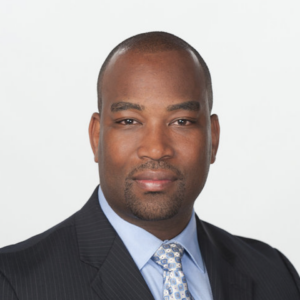Christopher Boone, PhD
AbbVie, VP, Global Head, Health Economics & Outcomes Research
Patient-Centered Outcomes Research Institute (PCORI) Board Member
When the inaugural class in the Master of Science in Health Law and Strategy arrives at the program’s final semester, industry and policy veteran Christopher Boone will be one of the professors leading them through the provocative issues surrounding the growing role of the federal government in stimulating and directing the development of information technology in healthcare organizations. Offered jointly by NYU Law and NYU Wagner, this interdisciplinary program prepares executives, regulators, entrepreneurs, and policy makers to lead innovation across the complex regulatory environment of the health sector.
Currently vice president, global head, health economics & outcomes research, at biopharmaceutical company AbbVie and an adjunct professor at NYU Wagner, Boone is also a board member of the Patient-Centered Outcomes Research Institute (PCORI), an independent nonprofit organization authorized by Congress in 2010—roles that inform the perspective he brings to his teaching.
Public Policy and Technological Advances Mean Rapid Evolvement in Health Law
Boone sees great potential in the new executive master’s program. “The fascinating aspect of this particular degree is its versatile relevance to different professional audiences,” he said. “For example, I can easily see an experienced attorney seeking to gain deeper knowledge on the healthcare industry in general and how health law is rapidly evolving due to public policy and technological advancements.
“As it pertains to government employees, they will find a tremendous value in hearing directly from faculty who are the foremost thought leaders in their respective fields but also bring real-world experience to addressing some of healthcare’s most complex problems. I could also see the program serving as additional training to assist government employees seeking to transition from the public sector to the private sector.”
Though Boone’s résumé is all healthcare-related, including jobs and board positions, healthcare wasn’t his initial calling. An MIS major at University of Tulsa, he had targeted the energy sector for a career, but internships in the electricity and oil & gas industries left him feeling “completely empty,” he recalled. “It was less than fulfilling when it came to living within my purpose. I remember sharing this perspective with a collegiate advisor who advised me to consider healthcare management as a career. After doing some research, I fell in love with the idea of being a hospital administrator, specifically the CEO of a public health system caring for marginalized and underserved populations. Upon graduating, I landed my first healthcare IT role at the University of Texas Southwestern Medical Center in Dallas.”
Since then, Boone has cycled back and forth between the public and private worlds, from Deloitte to the American Heart Association, the Health Data Consortium, and Pfizer, with stops in higher education. His expertise in data analytics, patient outcomes, and policy bona fides dominates his job descriptions.
Boone’s deep insight into the course he will be co-teaching—along with NYU Law Professor Jason Schulz, director of the law school’s Technology and Policy Clinic—derives largely from his public sector work, most recently his membership on the board of governors for PCORI, which focuses on funding comparative clinical effectiveness research that will inform healthcare decisions and improve healthcare delivery and outcomes. The organization has also established PCORNet, a national data infrastructure constructed for research.
That role, Boone said, “only reinforces my 360-degree perspective on the healthcare ecosystem and the various roles played by the public and private sectors in curating health data for evidence-based decision making purposes and my belief that the federal government has a vital role in it. It also shows how the federal government felt it was critical to establish an independent nonprofit that is authorized by Congress and governed by a trans-disciplinary board of governors representing the entire healthcare community.”
Complex Issues Facing the Healthcare Community
Boone’s course in particular is designed to engage students on some of the most complex issues facing the healthcare community. “I recognize there continues to be an ongoing tension between the right to privacy and the right to public health, and arguments can easily be made for or against each right in this particular case. The pandemic has certainly served as a catalyst for addressing this very question. Our contact tracing efforts were necessary, as we were in a public health crisis, but it should not be at the expense of all privacy rights.
Does the Act of Public Health Surveillance Become the Norm?
“Fundamentally, we must address the questions of what happens to the data when the public health crisis ends? Does the act of public health surveillance become the norm? Also, how do we prevent/address situations where discrimination and/or stigmatization occur within certain subpopulations? All things to consider as we move forward.”

